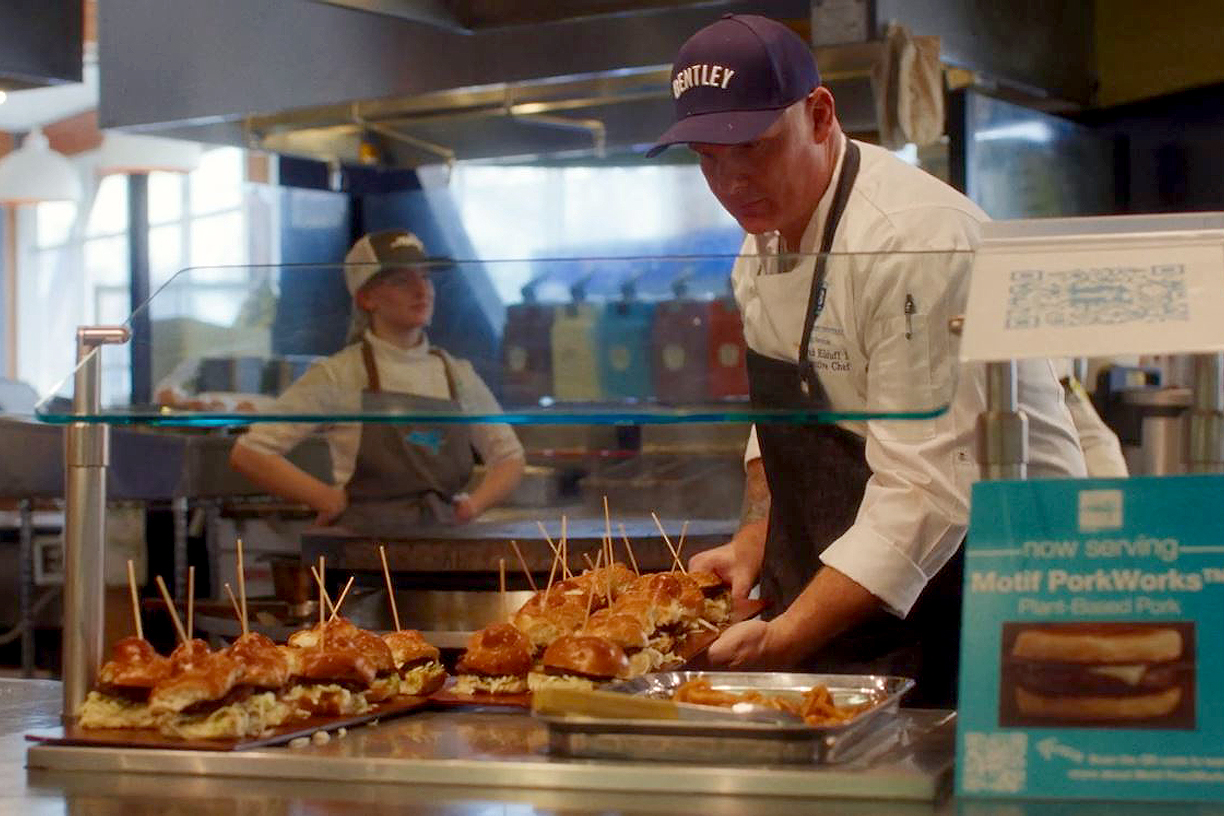Bentley Dining: Where Sustainability is on the Menu
According to the U.S Environmental Protection Agency, food is the single largest category of material placed in America’s municipal landfills. Yet a Bentley-Gallup survey found that 59% of Americans believe it is extremely important for businesses to prioritize practices like operating in an environmentally sustainable way; and McKinsey reports that people care about the environmental impact of what they eat, with Gen Z and millennials being the generations most interested in vegetarian, vegan and conscious-eating options. Bentley is helping to address both sides of the issue as the Office of Sustainability (OOS) partners with Bentley Dining to create sustainable dining programs focusing on four key priorities: health, planet, community and people.
“Consistent with the university’s commitment to sustainability, we’ve partnered with Dining Services to develop programs and initiatives that address food waste, food insecurity and sustainable growth,” says OOS Sustainability Director Natalie Hayes. “The initiatives not only help address the university’s carbon footprint, but they support efforts outside of Bentley too, including addressing food insecurity and supporting the local economy. Plus, they answer to our students’ call for food choices that are good for the planet.”
RELATED: Bentley commits to carbon neutrality by 2030
When it comes to program development, Hayes and her colleagues often start from the beginning of the sustainable dining lifecycle process, with local and regional sourcing of vegetables, and continue through pre- and post-consumer waste. Initiatives include:
- Partnering with the Harvest of the Month program through Mass Impact, which uses local farms and suppliers to create farm-to-table menus and educate students about sustainable practices.
- Composting pre-consumer food waste at all dining locations. Post-consumer food waste is collected at the 921, and LaCava Café has trash, recycling and compost bin sorting stations. Bentley composted 105 tons of food waste in 2022.
- Donating untouched, excess food to the local nonprofit Food for Free, which has resulted in the equivalent of 650 meals worth of food donated during a single semester.
- Participating in Swipe Out Hunger, a national program where students can donate “swipes” from their own meal plans to support students dealing with food insecurity.
Agricultural products are considered local if they meet established criteria — for example, are exclusively grown in Massachusetts or are derived from an animal that was raised for at least one-third of its life in Massachusetts. The majority of milk served at Bentley dining locations is produced from Massachusetts animals and honey is produced by colonies located exclusively in Massachusetts. Regional food refers to food grown, raised or harvested within the six New England states (ME, VT, NH, MA, RI and CT) plus a 50-mile radius.
“Local food sourcing is important as it reduces the transportation and energy emissions from sourcing our food,” says Sandy Cai ’26, who is an OOS student sustainability leader serving as public relations content creator. She is a double major in Accounting and Information Design and Corporate Communication with a concentration in User Experience. “In addition, we also support local businesses and keep them running.”
RELATED: On-campus farmers’ market supports local businesses
According to Hayes, additional Bentley Dining initiatives include working to reduce the waste associated with takeout food. One example is the “Green Box” program where community members purchase a reusable plastic to go box for $5 at the beginning of the semester and are allowed to reuse it at the 921 dining hall and LaCava rather than using disposable containers. Another program offers .25 cents back to people using reusable cups when getting coffee on campus and using compostable to-go containers where possible.
To increase the amount of plant-based meals, Bentley Dining has partnered with the Humane Society of the U.S. to get more diverse and interesting vegan options for a special vegan station in the 921 dining hall. In the Fall of 2021, the Humane Society and Bentley Dining Services formally entered the Food Forward pledge to increase the amount of plant-based menu offerings at 921 Dining Hall.

Cai, who grew up harvesting vegetables with her family, appreciates the meal offerings that feature locally sourced ingredients. “When I go to the 921, I always try to pick something vegetarian or vegan along with my food. Growing up, my parents influenced my love for vegetables. It was special to me when, for some meals, we ate our own vegetables that we’d grown in our backyard.”
Shreeya Bidawatka ’27, who also works as an OSS student sustainability leader as a public relations and outreach specialist, agrees. “I have a lot of friends who are vegetarian or vegan, and I find myself choosing that meal option because there’s so much variety. One of my favorite dishes is the vegetarian quesadilla.”
Both Bidawatka and Cai say that, since coming to Bentley, they’ve developed a deeper understanding of and appreciation for sustainability through their work with Hayes and the OOS team, along with sustainability courses such as Science of Sustainability (NAS 345) and student-driven programs like Students for Sustainable Business.
“At Bentley, it feels great to be part of a community that prioritizes sustainability,” Cai says. “Our generation is more mindful of the food choices that we make because through social media we see a lot of activism about the climate crisis as well as our health and well-being. A main reason that I’m passionate about sustainability is not just helping the environment but also empowering people.”
Bidawatka adds, “Coming to Bentley has ignited my passion for sustainability and it will always remain a part of my life. The beauty of sustainability is that it’s a continuous process: As the cycle resets, it supports a process that continues for years to come.”

